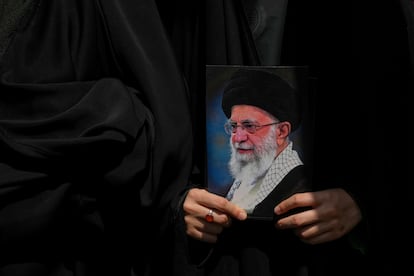US bombs Iran’s nuclear sites: Now what?
Is it possible that the Revolutionary Guard leaders will settle for a symbolic response? It’s possible, though unlikely

Since Iran’s secret nuclear program was revealed in 2002, academics and journalists have periodically speculated about the risk of a military clash between Iran and Israel, which perceived it as an existential threat. Each time, it was assumed that the U.S. would restrain the Israeli hawks’ desire to take action. No longer. U.S. President Donald Trump has not only backed Benjamin Netanyahu’s attack on the Islamic Republic, but has also joined the bombing. Now what?
The first analyses this Sunday speak of uncertainty. There is little uncertainty, however, for the Iranians under the falling bombs with no shelters to hide in (nor for Israelis unprotected by the Iron Dome, especially among the Arab population). There is little uncertainty for the inhabitants of neighboring countries who — whether or not U.S. bases or oil facilities on their soil are attacked — are already experiencing, like the rest of the world, the economic costs of instability. The operation has been misguided from the outset.
Beyond the impossibility of dismantling Iran’s nuclear program with bombs (not so much because of the bunkers protecting the facilities, but because of the knowledge already acquired), and beyond the illusion of regime change by airstrikes, the question now is where this war is leading us. The truth is, no one knows.
Some warn of a broader regional conflict — and with good reason. Faced with such blatant aggression, what other option does the Iranian regime have? Bomb U.S. bases in the Arabian Peninsula, as the Revolutionary Guard has threatened, or carry out attacks against U.S. or Israeli interests outside the theater of war. But it’s not that simple.
A rumor circulating on social media says that if Iran’s Supreme Leader, Ali Khamenei, responds weakly, he will lose face (and, I’d add, the little legitimacy he still holds), but if he responds forcefully, he might lose his head. Both Netanyahu and Trump have said they know where he’s hiding, and some media outlets claim Khamenei has already named potential successors just in case.
But since the primary objective of the Islamist regime that has ruled Iran since the 1979 revolution is its own survival, less dramatic options remain possible. Could the heads of the Revolutionary Guard — the real power brokers in Tehran — settle for a symbolic response and then agree to enter serious diplomatic negotiations with the U.S.? It’s possible, though unlikely. Unless it’s a ploy like the one Trump used when he claimed he’d take two weeks to decide whether to attack Iran, though he already had made his decision.
There are also other seemingly more reassuring possibilities — though only seemingly. Perhaps the mobilization of the Gulf states, allies of Trump and fearful that a clash between Tel Aviv and Tehran could wreck their economies, along with some parallel diplomatic efforts, will manage to prevent the dreaded escalation — without actually producing an agreement. In other words, the conflict could become entrenched, like so many others we shamelessly live with in the 21st century.
The speed at which news and non-news spreads will ensure we forget quickly. We’ll move on. Meanwhile, the current Iranian regime — or whatever comes after it — will have learned the lesson and be more determined than ever to acquire nuclear weapons to protect itself from a possible attack.
Sign up for our weekly newsletter to get more English-language news coverage from EL PAÍS USA Edition
Tu suscripción se está usando en otro dispositivo
¿Quieres añadir otro usuario a tu suscripción?
Si continúas leyendo en este dispositivo, no se podrá leer en el otro.
FlechaTu suscripción se está usando en otro dispositivo y solo puedes acceder a EL PAÍS desde un dispositivo a la vez.
Si quieres compartir tu cuenta, cambia tu suscripción a la modalidad Premium, así podrás añadir otro usuario. Cada uno accederá con su propia cuenta de email, lo que os permitirá personalizar vuestra experiencia en EL PAÍS.
¿Tienes una suscripción de empresa? Accede aquí para contratar más cuentas.
En el caso de no saber quién está usando tu cuenta, te recomendamos cambiar tu contraseña aquí.
Si decides continuar compartiendo tu cuenta, este mensaje se mostrará en tu dispositivo y en el de la otra persona que está usando tu cuenta de forma indefinida, afectando a tu experiencia de lectura. Puedes consultar aquí los términos y condiciones de la suscripción digital.









































